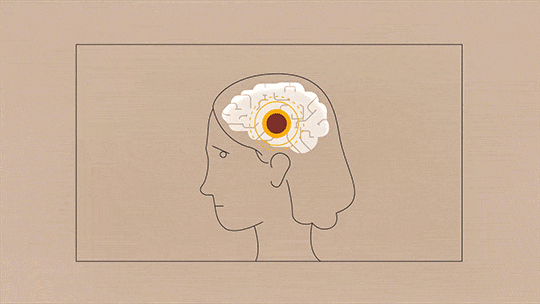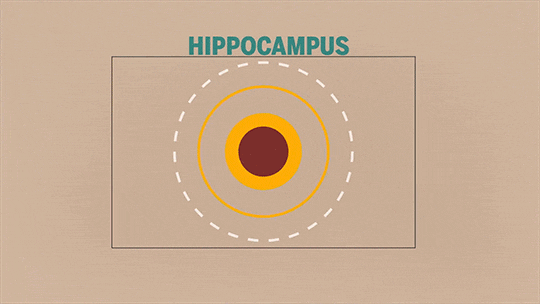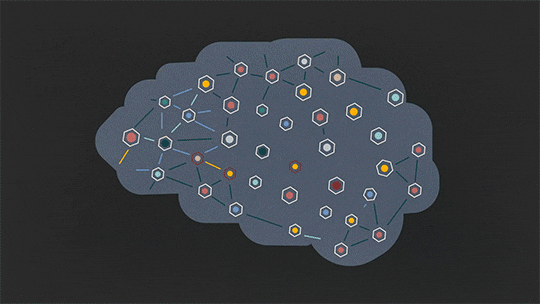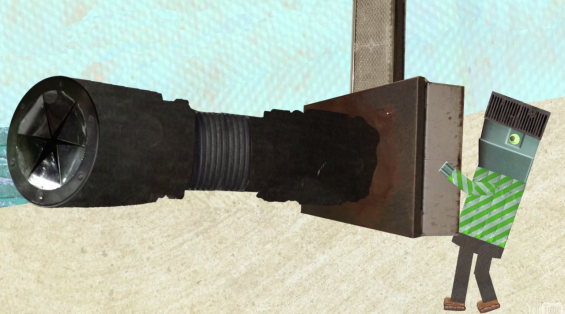
How stress affects your brain (in TED-Ed GIFs)

Are you sleeping restlessly, feeling irritable or moody, forgetting little things, and feeling overwhelmed and isolated? Don’t worry. We’ve all been there. You’re probably just stressed out. Stress isn’t always a bad thing. It can be handy for a burst of extra energy and focus, like when you’re playing a competitive sport, or have to speak in public. But when it’s continuous, the kind most of us face day in and day out, it actually begins to change your brain. Chronic stress, like being overworked or having arguments at home, can affect brain size, its structure, and how it functions, right down to the level of your genes.

Stress begins with something called the hypothalamus pituitary adrenal axis, a series of interactions between endocrine glands in the brain and on the kidney, which controls your body’s reaction to stress. When your brain detects a stressful situation, your HPA axis is instantly activated and releases a hormone called cortisol, which primes your body for instant action. But high levels of cortisol over long periods of time wreak havoc on your brain. For example, chronic stress increases the activity level and number of neural connections in the amygdala, your brain’s fear center. And as levels of cortisol rise, electric signals in your hippocampus, the part of the brain associated with learning, memories, and stress control, deteriorate.

The hippocampus also inhibits the activity of the HPA axis, so when it weakens, so does your ability to control your stress. That’s not all, though. Cortisol can literally cause your brain to shrink in size.

Too much of it results in the loss of synaptic connections between neurons and the shrinking of your prefrontal cortex, the part of your brain the regulates behaviors like concentration, decision-making, judgement, and social interaction. It also leads to fewer new brain cells being made in the hippocampus. This means chronic stress might make it harder for you to learn and remember things, and also set the stage for more serious mental problems, like depression and eventually Alzheimer’s disease.

It’s not all bad news, though. There are many ways to reverse what cortisol does to your stressed brain. The most powerful weapons are exercise and meditation, which involves breathing deeply and being aware and focused on your surroundings. Both of these activities decrease your stress and increase the size of the hippocampus, thereby improving your memory.

So don’t feel defeated by the pressures of daily life. Get in control of your stress before it takes control of you.
From the TED-Ed Lesson: How stress affects your brain:
Animation by Andrew Zimbelman/TED-Ed
To learn something new every week, sign up here for the TED-Ed Newsletter.



This is what I’ve been looking for. Thanks for the information it helps me a lot, and knowing that it can lead to Alzheimer’s Disease. But can I ask? I’ve been doing my stuff and home works all day and in the night, i am reading or reviewing my notes. But at the end of the day, I didn’t remember anything.So, if I may, I will just ask if how will I remember the things that I have read? Or what particular strategy that i will do? Thank you
You can try many things to increases what you will remember while studying. Pick something that works for you because everyone learns differently. I personally like to draw pictures of notes I just looked at. You can try the “loci” method of studying which involves associating places with certain words or phrases. You can associate objects with words or phrases. You can take a moment to think about how certain notes relate to you personally. Think about at what place or time in your life that you had seen a concept. You could concept map by organizing and categorizing notes. You could make mnemonic devices. this is an example from a biology course.
Mnemonic device
“Some Grownups Can’t See Magic Ponies But Children CAN”
Explanation
Classes and subclasses of Phylum Mollusca:
S = Scaphopoda
G = Gastropoda
C = Caudofoveata
S = Solenogastres
M = Monoplacophora
P = Polyplacophora
B = Bivalvia
C = Cephalopodia
CAN = (sub-classes of Cephalopoda) Coleoids, Ammonoids, and Nautiloids
now for classes, some tips would be to ask questions on anything you don’t understand and if you need to, schedule some one on one time with the teacher or professor.
Go through the chapter you know you will go over in class while waiting for class to begin, that way you can make questions and get a general overview and understanding of the material. There are many more effective ways to study and retain information. You can make up games, discuss notes with classmates, etc. If you do things like this you should see an improvement in your grades. It can be really fun and it really does help. Best of luck to you!
ya its happen
I enjoyed this informative information on stress, i have suffered several years with stress. I didn’t realize that stress can effect your comprehension abilities, but now i know why i have a difficult time studying and remembering all data. I feel this would be a great video to show to 6th graders, because i noticed a few of them look stressed. And the damage stress can cause is a good reason to find ways to alleviate stress.
I enjoyed watching this informative blog regarding stress. I suffer from chronic stress, and i know what i need to help alleviate to symptoms. However i didn’t know that it can affect a person comprehension; i always have problems remembering information on test and i study constantly. Great information. Thanks
I hope that, now we know how it works, it will make adults behave differently with children.
So stress can shrink your brain? That is news for me. Very interesting! I’m happy to know there are ways to fix this.
Stress shrinks my brain? I really have to work out more!
For Sheila. If what you say is true, didn’t remember anything, there could be several reasons: information overload, stress, poor learning skills, tiredness …. You may need to develop your meta-learning skills, ie learning how to learn. There are many sources for learning skills. Some basics are – give yourself time to think about the new information, translate it in to words that you understand, link the new information with previously learned information, diagram the info, give yourself breaks between learning periods, exercise, eat properly, don’t be afraid to ask for help from others. Find the learning style/s that suit you and don’t expect perfection.
This is an eye opener.
Will start my practice today with meditation then follow up with exercise. Thanks
This is a very wonderful simple explanation and very helpful.
Wonderful! Thanks
I hope that, now we know how it works, it will make adults behave differently with children.